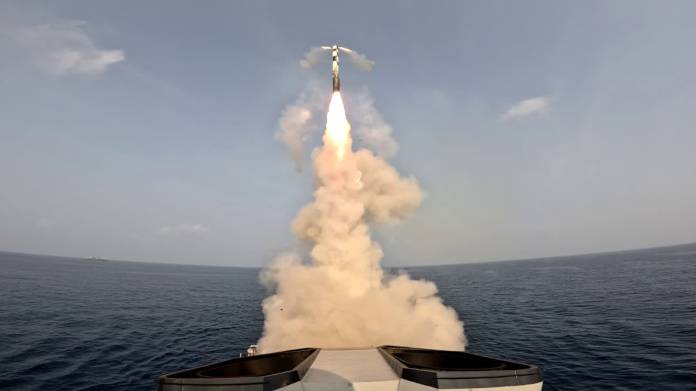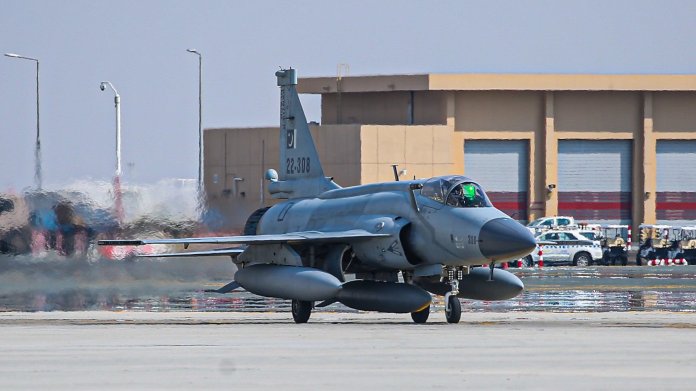Efforts to establish a NATO-led European missile shield have ricocheted off national political challenges, regional rivalries and commercial interests, with a scheduled June meeting of allied and Russian defense ministers pivotal to charting the way forward.
Russian officials have directly linked participation in European missile defense to the U.S.-Russian New START, which took force Feb. 5. Two days after the strategic arms treaty went into effect, Russian Deputy Foreign Minister Sergei Ryabkov told journalists that Russia would consider withdrawing from the New START if Washington aggressively pushed for the missile shield.
"If the U.S. bolsters the qualitative and quantitative potential of its missile defense, a question will arise whether Russia should further stick to the treaty or would be forced to take measures to respond to the situation, including military and technical measures," the diplomat said at a Feb. 7 news conference.
At the NATO-Russia November summit in Lisbon, Moscow and the alliance agreed to jointly develop a European missile defense. However, Russian officials lately have expressed concerns that two separate missile defense systems will be built in Europe: one by the U.S. and NATO without Russian participation, and the second by NATO together with Russia.
On Feb. 11, President Dmitry Medvedev appointed Russia's special envoy to NATO, Dmitry Rogozin, to the newly created post of special presidential representative on anti-missile defense and ordered creation of an interagency task force to cooperate with NATO. The group is expected to begin its work by March 31 and will be responsible for coordinating the negotiating process with NATO.
"This issue will really become either critically important for mutual understanding and further rapprochement between Russia and the West in military policies, or it will throw back our relations for several years and maybe even decades," Rogozin said in Brussels on March 1, the official RIA Novosti agency reported.
Deputy Defense Minister Anatoly Antonov said at the Feb. 7 news conference that missile defense is "a kind of litmus test that will allow us to see whether NATO members and the United States are ready for open, equal, honest and parity-based cooperation."
NATO and Russian defense ministers are to convene in June to discuss the results of a missile threat assessment by the group of experts who are also to report about the feasibility of building a joint missile defense system.
The initial assessment cites missile threats to Europe from the south, Rogozin said, but he questions why some plans are oriented toward northern Europe.
"Buildup of the strategic anti-missile defense in Northern Europe, where not a single expert identified a possible threat, is an unpleasant signal for us," he said, apparently referring to the U.S. plans to install elements of the missile defense system in Poland. Poland Poland has been at the center of European missile defense efforts and conflicts. Under plans proposed by U.S. President George W. Bush, Poland would have hosted interceptors. President Barack Obama scrapped that plan for an Aegis-ship based system, but still would install interceptors in Poland, as announced during the March 3 visit to Washington of Polish Foreign Minister Radek Sikorski.
Meanwhile, Poland also is pursuing a national missile defense effort that could include a combination of Patriots from Germany and development of a new system, although some question whether these efforts conflict.
Polish Defense Minister Bogdan Klich and Germany's former defense minister, Karl-Theodor zu Guttenberg, discussed a possible sale of up to 12 Patriot missile batteries during Guttenberg's Feb. 15 visit to Warsaw. "We are in the middle of talks on acquiring a number of Patriot missile batteries from Germany," Klich said at a press briefing after that meeting.
"We are linked by common proposals, goals and priorities," Guttenberg said at the briefing. "Poland is our partner. During the next few weeks, we will be holding talks on this issue."
Meanwhile, according to earlier reports by the local media, the Polish Ministry of Defense planned to launch a tender for an air defense system by the end of this year. The deal was reported to be worth about $5 billion.
In early 2010, five bidders responded to a request for technical specifications. These included proposals submitted by Raytheon and Norway's Kongsberg; MBDA and Poland's Bumar Group; Raytheon and Israel's Rafael; Germany's Diehl BGT Defense; and Israel Aerospace Industries. "We have designed a project of an air defense system, dubbed the Shield for Poland," said Edward Nowak, chief executive of Bumar Group. "It currently is our most significant project."
According to Nowak, the joint pitch of the local defense industry and MBDA has been wrongly seen as directly competing with plans to deploy elements of a U.S. missile shield on Polish soil, and the two projects would complement each other.
State-owned Bumar, which is Poland's largest defense group, said it hopes that joining forces with European manufacturer MBDA, which is offering the Aster 30 and VL Mica missiles, will improve its chances of securing the multibillion-dollar contract.
"The lack of developed missile products has been the biggest shortcoming of Poland's defense industry. While we have the necessary know-how and technology in radio location and C4ISR systems, we lack the technology in missile production," said Tomasz Badowski, chief defense analyst at the Euro-Atlantic Association, a think tank in Warsaw. "Cooperation with MBDA could permit [the Polish industry] to bridge the tech gap."
As Germany's bid could jeopardize the launch of the air defense tender, Bumar has intensified its research efforts and hopes to get government funding to quickly push ahead with a proposal and win the bid in its consortium with MBDA.
Poland's troubled relations with Russia play a key role in Warsaw's drive to acquire a new air defense system, analysts say. Medvedev visited the Polish capital Dec. 6, a trip that marked the first official visit by a Russian head of state to Poland in more than eight years, but the two countries have maintained frosty relations until recently.
The deployment of U.S. Patriot missiles on a training rotation at the Polish military base of Morag, in the country's northeast, was blasted by Moscow. Poland responded to Russia's objections in October, when the missiles were moved from Morag, where they have been stationed since last May, to the base in Torun, away from the Russian border.
Badowski said Poland's current air defense system is outdated and, despite Army modernization efforts, its cornerstone is based on Soviet technology.
"The missile defense systems used by anti-aircraft units of the Air Force are simply not capable of eliminating potential threats from the air," he said.
Norway In Norway, politicians skillfully linked support for the NATO missile shield with its own strategic High North defense plan. Norway had initially shown clear reluctance to row in behind the NATO plan, but warmed to the project after persuading NATO to deepen its commitment to High North and Arctic defenses.
The substantive concern among Norwegian legislators and military was that the shield would offer protection only to some NATO members; Norway was adamant it protect all NATO states. The transition from being an opponent to a supporter of the plan was rapid. Anne-Grete Strøm-Erichsen, Norway's former defense minister, was the only representative to publicly voice opposition to the plan at a NATO meeting in Vilnius in February 2008.
Strøm-Erichsen told the NATO meeting in the Lithuanian capital that Norway questioned the "need for a missile defense system," warning such a move could trigger "an arms race."
Extending the system's geo-graphic range was proposed during discussions between Benson Whitney, the then-U.S. ambassador to Norway, and Norway's state secretary for foreign affairs, Raymond Johansen.
Whitney noted that Norway was likely to abandon its opposition if the protective umbrella was broadened to include all NATO-aligned states in Europe, and if NATO was open to signing bilateral agreements on missile defense with Poland and the Czech Republic.
Norway regarded the widening of the protective range as pivotal to its objective of strengthening its own anti-missile capability, primarily directed at Russia's long- and medium-range missile arsenal on its doorstep on the Kola Peninsula.
However, this strategic view changed as Norway became more proactive in building a so-called "bridge of cooperation" between NATO and Russia on the missile shield issue, in the hope that a joint NATO-Russian solution would better serve the country's security interests in the High North Norway's initial lukewarm reception to the missile defense system was also influenced by its wish to see NATO cooperate with Russia on a broader missile defense program. The Norwegian view is that the dividend in NATO-Russian cooperation in this arena is reduced tension in the High North and Arctic regions.
To this extent, Norway got its wish when the Obama administration decided to scrap the missile shield in Poland and the Czech Republic in favor of expanding the shield program to include all NATO countries in Europe and North America.
NATO-Russian missile shield cooperation has long been regarded by Norway as the best means of accelerating the end to the last remnants of the Cold War. Norway lobbied strongly for NATO to invite Russia to the negotiating table ahead of the organization's summit meeting in Lisbon last November. "By reaching out and inviting Russia to cooperate with us, I believe we also have a real chance to build a security roof for the entire Euro-Atlantic area," NATO Secretary General Anders Fogh Rasmussen said in Lisbon. The U.S. and NATO have a special interest in maintaining a trouble-free relationship with Norway, which has increased its funding toward surveillance of Russian forces on Kola and provided intelligence data on changing missile capabilities and progress on new missile assets and tests by Russia in the region.
This intelligence transfer will cover the planned test-firing of Bulava missiles by the Severodvinsk-based Yuri Dolgoruky Borey-class submarines, the newest strategic subs in Russia's fleet, in June or July. Turkey In Turkey, a decision about acquiring a national long-range air defense system will likely wait for several months after June legislative elections. Meanwhile, Turkey's participation in the NATO missile shield has involved some politically touchy issues.Turkey's proposed national air defense system is being designed to counter both aircraft and ballistic missiles, and will be independent from the NATO missile shield. But since both systems are, by nature, anti-ballistic missile schemes and both are supposed to protect Turkish soil, they will have to be integrated in some way.
But the U.S. and some of its Western partners are staunchly opposed to the integration of any Russian or Chinese system into the NATO missile shield.
"American officials already have said that non-NATO elements would cause serious interoperability problems," one Turkish diplomat said.
The defense analyst said Western worries are related to both defense and commercial concerns.
"They [the Westerners] simply don't want Turkey to select Russian or Chinese options, and part of their concern is commercial," the diplomat said.
In the event Turkey effectively drops Russia and China from the list of contenders, the competition will be left to a rivalry between U.S. and Italian-French companies.
At the Lisbon summit, Turkey managed to persuade its NATO partners not to mention any countries as specific threats, although French President Nicolas Sarkozy explicitly said the ballistic missile threat was coming from Iran. At Turkey's request, the need to protect all NATO territory was also included in the decision text, as Turkey has close and developing ties with Iran.
"In any case, Turkish and NATO officials will have tough talks, with Turkey wanting a lot in return for the deployment of X-band radars on its territory," the defense analyst said. "Again, the next Turkish Cabinet will make the final decision on that."
Nabi Abdullaev in Moscow, Jaroslaw Adamowski in Warsaw, Burak Ege Bekdil and Umit Enginsoy in Ankara, and Gerard O'Dwyer in Helsinki contributed.


:quality(70)/cloudfront-us-east-1.images.arcpublishing.com/archetype/VL6XK33ABJC4JF3EWVQACCMN6M.jpg)


